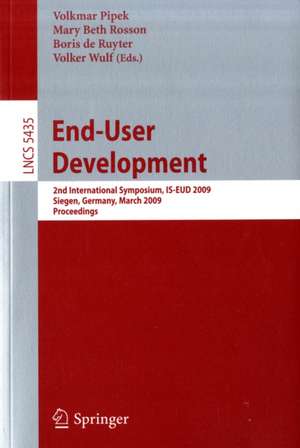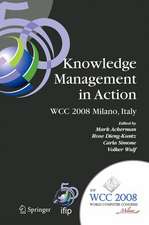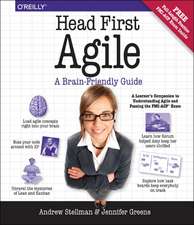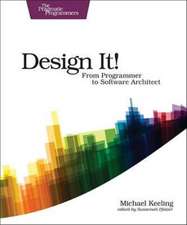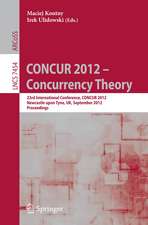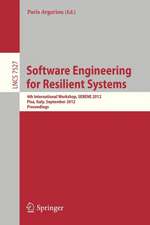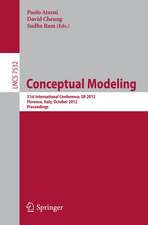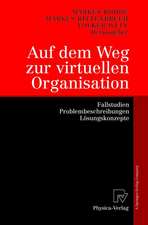End-User Development: 2nd International Symposium, IS-EUD 2009, Siegen, Germany, March 2-4, 2009, Proceedings: Lecture Notes in Computer Science, cartea 5435
Editat de Volkmar Pipek, Mary-Beth Rosson, Volker Wulfen Limba Engleză Paperback – 27 feb 2009
Din seria Lecture Notes in Computer Science
- 20%
 Preț: 1061.55 lei
Preț: 1061.55 lei - 20%
 Preț: 307.71 lei
Preț: 307.71 lei - 20%
 Preț: 438.69 lei
Preț: 438.69 lei - 20%
 Preț: 579.30 lei
Preț: 579.30 lei -
 Preț: 410.88 lei
Preț: 410.88 lei - 17%
 Preț: 427.22 lei
Preț: 427.22 lei - 20%
 Preț: 596.46 lei
Preț: 596.46 lei - 15%
 Preț: 448.04 lei
Preț: 448.04 lei - 20%
 Preț: 353.50 lei
Preț: 353.50 lei -
 Preț: 389.49 lei
Preț: 389.49 lei - 20%
 Preț: 309.90 lei
Preț: 309.90 lei - 20%
 Preț: 645.28 lei
Preț: 645.28 lei - 20%
 Preț: 763.23 lei
Preț: 763.23 lei - 15%
 Preț: 580.46 lei
Preț: 580.46 lei - 20%
 Preț: 310.28 lei
Preț: 310.28 lei - 20%
 Preț: 655.02 lei
Preț: 655.02 lei - 20%
 Preț: 1183.14 lei
Preț: 1183.14 lei - 20%
 Preț: 340.32 lei
Preț: 340.32 lei -
 Preț: 449.57 lei
Preț: 449.57 lei - 20%
 Preț: 591.51 lei
Preț: 591.51 lei - 18%
 Preț: 938.83 lei
Preț: 938.83 lei - 20%
 Preț: 337.00 lei
Preț: 337.00 lei - 20%
 Preț: 649.50 lei
Preț: 649.50 lei - 20%
 Preț: 607.40 lei
Preț: 607.40 lei - 20%
 Preț: 1414.79 lei
Preț: 1414.79 lei - 20%
 Preț: 1024.44 lei
Preț: 1024.44 lei - 20%
 Preț: 583.40 lei
Preț: 583.40 lei - 20%
 Preț: 453.32 lei
Preț: 453.32 lei - 20%
 Preț: 575.49 lei
Preț: 575.49 lei - 20%
 Preț: 1075.26 lei
Preț: 1075.26 lei - 20%
 Preț: 585.88 lei
Preț: 585.88 lei - 20%
 Preț: 825.93 lei
Preț: 825.93 lei - 17%
 Preț: 360.20 lei
Preț: 360.20 lei - 20%
 Preț: 763.23 lei
Preț: 763.23 lei - 20%
 Preț: 340.32 lei
Preț: 340.32 lei - 20%
 Preț: 504.58 lei
Preț: 504.58 lei - 20%
 Preț: 369.13 lei
Preț: 369.13 lei - 20%
 Preț: 580.93 lei
Preț: 580.93 lei - 20%
 Preț: 343.62 lei
Preț: 343.62 lei - 20%
 Preț: 350.21 lei
Preț: 350.21 lei - 20%
 Preț: 583.40 lei
Preț: 583.40 lei - 20%
 Preț: 583.40 lei
Preț: 583.40 lei - 15%
 Preț: 438.59 lei
Preț: 438.59 lei - 20%
 Preț: 341.95 lei
Preț: 341.95 lei - 20%
 Preț: 238.01 lei
Preț: 238.01 lei - 20%
 Preț: 538.30 lei
Preț: 538.30 lei
Preț: 333.22 lei
Preț vechi: 416.52 lei
-20% Nou
Puncte Express: 500
Preț estimativ în valută:
63.78€ • 69.30$ • 53.61£
63.78€ • 69.30$ • 53.61£
Carte tipărită la comandă
Livrare economică 21 aprilie-05 mai
Preluare comenzi: 021 569.72.76
Specificații
ISBN-13: 9783642004254
ISBN-10: 3642004253
Pagini: 295
Ilustrații: X, 285 p.
Dimensiuni: 155 x 235 x 20 mm
Greutate: 0.44 kg
Ediția:2009
Editura: Springer Berlin, Heidelberg
Colecția Springer
Seriile Lecture Notes in Computer Science, Programming and Software Engineering
Locul publicării:Berlin, Heidelberg, Germany
ISBN-10: 3642004253
Pagini: 295
Ilustrații: X, 285 p.
Dimensiuni: 155 x 235 x 20 mm
Greutate: 0.44 kg
Ediția:2009
Editura: Springer Berlin, Heidelberg
Colecția Springer
Seriile Lecture Notes in Computer Science, Programming and Software Engineering
Locul publicării:Berlin, Heidelberg, Germany
Public țintă
ResearchCuprins
Invited Talks.- End-User Development and Meta-design: Foundations for Cultures of Participation.- What Is End-User Software Engineering and Why Does It Matter?.- Refereed Papers.- Mutual Development: A Case Study in Customer-Initiated Software Product Development.- Appropriation Infrastructure: Supporting the Design of Usages.- Supporting End Users to Be Co-designers of Their Tools.- Improving Documentation for eSOA APIs through User Studies.- End-User Development of Enterprise Widgets.- End-User Development for E-Government Website Content Creation.- LWOAD: A Specification Language to Enable the End-User Develoment of Coordinative Functionalities.- Shaping Collaborative Work with Proto-patterns.- Web Design Patterns: Investigating User Goals and Browsing Strategies.- Males’ and Females’ Script Debugging Strategies.- Hypertextual Programming for Domain-Specific End-User Development.- Fast, Accurate Creation of Data Validation Formats by End-User Developers.- Refereed Notes.- Cicero Designer: An Environment for End-User Development of Multi-Device Museum Guides.- Observing End-User Customisation of Electronic Patient Records.
Textul de pe ultima copertă
This book constitutes the refereed proceedings of the 2nd International Symposium on End User Development, IS-EUD 2009, held in Siegen, Germany in March 2009.
The 12 revised full papers presented together with 2 invited talks and 2 refereed notes were carefully reviewed and selected. The papers report latest advances in the field of "End User Development" (EUD) such as collective understanding and sense-making of use problems and solutions, the interaction among end users with regard to the introduction and diffusion of new configurations, or delegation patterns that may also partly involve professional designers.
The 12 revised full papers presented together with 2 invited talks and 2 refereed notes were carefully reviewed and selected. The papers report latest advances in the field of "End User Development" (EUD) such as collective understanding and sense-making of use problems and solutions, the interaction among end users with regard to the introduction and diffusion of new configurations, or delegation patterns that may also partly involve professional designers.
